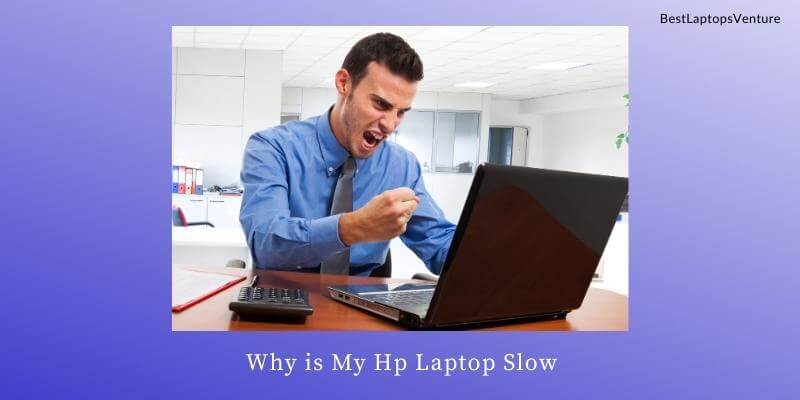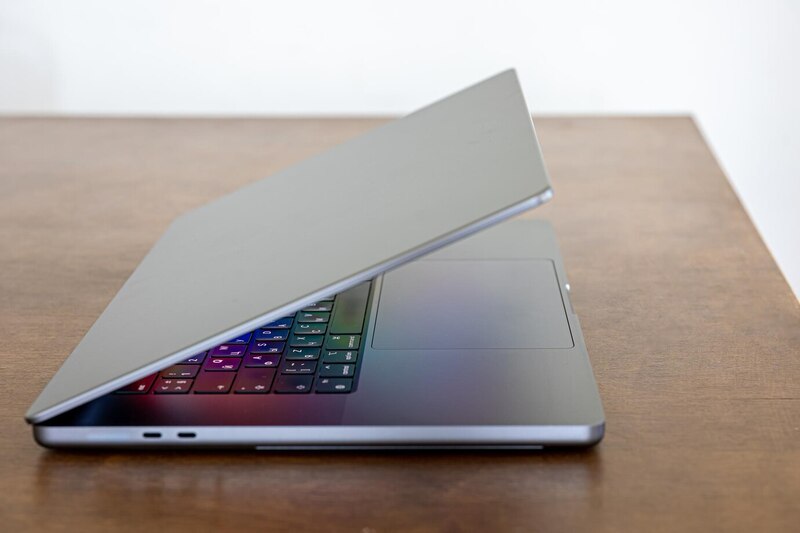
Your HP laptop may be slow due to various reasons, such as a lack of memory, too many background processes, or malware infections. Is your HP laptop lagging or taking forever to load?
This frustrating experience can hinder productivity and annoy. Identifying the reasons behind your laptop’s sluggish performance is crucial in finding the appropriate solutions.
From insufficient memory capacity to excessive background processes and even malware infections, several factors can contribute to a slow HP laptop.
We will explore the common causes of sluggishness in HP laptops, offering insights into how you can troubleshoot and optimize your device’s performance.
By following our guidelines, you can speed up your laptop and enjoy seamless computing once again.
Common Causes Of Slow Performance

Is your HP laptop running slower than usual? If so, several common causes could be behind the sluggishness. Identifying these causes can help you determine the appropriate solutions and get your laptop back to its normal speed.
In this article, we will explore some of the most common factors that contribute to slow performance in HP laptops.
1. Background Processes And Startup Programs
One of the leading causes of slow performance in HP laptops is the presence of excessive background processes and startup programs. When you start your laptop, various programs and processes automatically run in the background.
These processes consume valuable system resources, such as CPU, memory, and disk space, which can significantly impact the overall speed and responsiveness of your laptop.
To determine if this is the cause of your laptop’s slow performance, you can open the Task Manager by pressing Ctrl + Shift + Esc and check the list of processes running on your system.
Look for any resource-intensive processes or unnecessary startup programs that you can disable or uninstall.
2. Insufficient Ram And Storage Space
Another common cause of slow performance is insufficient random access memory (RAM) and storage space on your HP laptop. RAM plays a crucial role in running programs and multitasking efficiently.
If your laptop has limited RAM, it may struggle to handle multiple applications simultaneously, resulting in slower performance and frequent system freezes.
Similarly, if your laptop’s storage space is nearly full, it can slow down the system as it struggles to find available space for temporary files and data storage
This can lead to longer boot times, program crashes, and overall sluggishness.
To address these issues, you can consider upgrading your laptop’s RAM for better multitasking capabilities and freeing up storage space by deleting unnecessary files or transferring them to an external storage device.
3. Outdated Operating System And Software
An outdated operating system or software can also contribute to a slow HP laptop. Over time, new updates and patches are released to improve system performance, fix bugs, and enhance security.
If you fail to keep your operating system and software up to date, you may experience compatibility issues and reduced overall performance.
Regularly check for updates and install them to ensure that your laptop is running the latest version of the operating system and software applications.
This will not only optimize performance but also provide you with the latest features and security enhancements.
4. Malware And Virus Infections
Lastly, malware and virus infections can hamper the performance of your HP laptop. These malicious programs can consume system resources, slow down processing speed, and cause unexpected crashes.
If you notice unusual behavior, such as frequent pop-ups, unresponsive applications, or significantly slower performance, it’s essential to scan your laptop for malware and viruses.
Ensure that you have reliable antivirus software installed and regularly update its virus definitions.
Perform full system scans to detect and remove any malware or viruses that may be causing your laptop to slow down.
Impact Of Hardware Issues On Laptop Speed

In today’s fast-paced digital world, a slow laptop can be a major hindrance. It not only affects productivity but also leads to frustration and annoyance.
While there can be several reasons why your HP laptop is running slow, hardware issues are often a key culprit.
Let’s delve into the impact of hardware issues on laptop speed, focusing on two significant factors: overheating and fan malfunction, and faulty hard drive or SSD.
Additionally, we’ll also explore the role of an inadequate graphics card in slowing down your laptop’s performance.
1. Overheating And Fan Malfunction
One of the most common hardware issues that can decrease your HP laptop’s speed is overheating and fan malfunction. When your laptop starts to overheat, it affects the overall performance and speed of the system.
The primary cause of overheating is the accumulation of dust and debris on the cooling system, preventing proper airflow and heat dissipation.
Moreover, a malfunctioning fan can exacerbate the issue by failing to remove the excess heat generated by the laptop’s components. The fan plays a crucial role in maintaining optimal temperature levels by expelling hot air out of the system.
When the fan malfunctions, it leads to increased heat buildup, throttling the performance and causing your HP laptop to operate at a slower pace.
| Effects of Overheating and Fan Malfunction |
|---|
| 1. Decreased processing speed |
| 2. Frequent system crashes and freezing |
| 3. Sluggish response times |
| 4. Inability to run resource-intensive tasks smoothly |
2. Faulty Hard Drive Or SSD
Your laptop’s hard drive or solid-state drive (SSD) is responsible for storing and retrieving data. If you’re experiencing sluggish performance on your HP laptop, it could be due to a faulty hard drive or SSD.
When the hard drive or SSD starts to fail, it can result in slower read and write speeds, making it challenging for your laptop to access and retrieve data efficiently.
Additionally, bad sectors on the hard drive can lead to data corruption and file fragmentation, further hindering the laptop’s speed.
| Signs of a Faulty Hard Drive or SSD |
|---|
| 1. Slow boot-up and shutdown times |
| 2. Delayed file opening and saving |
| 3. Frequent system crashes and error messages |
| 4. Unusual clicking or grinding noises from the hard drive |
3. Inadequate Graphics Card
Another hardware component that can impact your HP laptop’s speed is the graphics card. A graphics card is responsible for rendering visual content, such as images, videos, and games.
If your laptop has an inadequate graphics card, it may struggle to handle demanding graphical tasks, resulting in slower performance.
An underpowered or outdated graphics card can lead to laggy visuals, stuttering frame rates, and delayed display responses. This can be particularly noticeable when running graphic-intensive applications, playing games, or watching high-resolution videos.
| Signs of an Inadequate Graphics Card |
|---|
| 1. Choppy and laggy visuals |
| 2. Low frame rates and stuttering |
| 3. Inability to run graphics-intensive tasks smoothly |
| 4. Flickering or distorted display |
The Role Of Software And Settings In Laptop Speed
Is your HP laptop running frustratingly slow? There could be several reasons behind its sluggish performance, and many of them are related to software and settings.
In this article, we’ll explore some common factors that can affect the speed of your laptop and how you can address them effectively.
1. Bloatware And Unnecessary Applications
One of the primary culprits behind a slow HP laptop is bloatware – that pre-installed software that comes with your machine. While it may seem harmless, bloatware can consume valuable system resources, leading to decreased performance.
Additionally, having unnecessary applications installed on your laptop can also have a similar impact.
To combat this issue, it’s essential to identify and remove any bloatware or unnecessary applications from your laptop. Begin by reviewing the list of installed programs in the Control Panel or the Settings app on Windows 10.
Look for any programs that you no longer use or don’t recognize. Uninstall them to free up valuable space and improve your laptop’s speed. A clean and streamlined system will undoubtedly result in a faster and more efficient HP laptop.
2. Corrupted Or Fragmented Files
Over time, your laptop’s files can become corrupted or fragmented, impacting its performance. Corrupted files can lead to errors and crashes, while fragmented files can slow down your laptop’s overall responsiveness.
It’s crucial to regularly check your system for such issues and address them promptly.
For checking and fixing corrupted system files, you can use the built-in System File Checker tool on Windows.
Open the Command Prompt as an administrator and type sfc /scannow to initiate the scanning process.
If any corrupted files are found, the tool will attempt to repair them automatically.
Fragmented files, on the other hand, can be fixed by using the Disk Defragmenter tool. This utility consolidates fragmented files, improving system performance.
Simply search for ‘Defragment and Optimize Drives’ in the Start menu, select your main hard drive, and click on ‘Optimize’ to begin the defragmentation process.
3. Power And Performance Settings
Another aspect to consider when addressing a slow HP laptop is to optimize your power and performance settings. By default, laptops tend to be configured for power efficiency rather than maximum performance.
While this can be beneficial for battery life, it might hinder the overall speed of your laptop.
To optimize power and performance settings, start by accessing the Power Options in the Control Panel or the Settings app.
Look for a power plan that is tailored to high performance. Select it to maximize your laptop’s speed. Keep in mind that this may impact your battery life, so it’s essential to find a balance that suits your usage.
4. Driver Issues
Outdated or incompatible drivers can also contribute to a slow HP laptop. Drivers are essential software components that facilitate communication between your laptop’s hardware and operating system.
If they are outdated or incompatible, your laptop’s performance can suffer.
To address this issue, ensure that your drivers are up to date. You can visit the official HP website and locate the drivers section for your specific laptop model.
Download and install any available updates for your drivers, especially for the chipset, graphics, and network drivers.
This will ensure that your laptop is utilizing the latest optimizations and bug fixes, ultimately improving its speed and overall performance.
Tips And Tricks To Improve HP Laptop Speed
Is your HP laptop running slow? Don’t worry, we’ve got you covered. In this section, we will explore some effective tips and tricks to boost the speed of your HP laptop.
By following these steps, you can optimize your laptop’s performance and enjoy a smoother computing experience.
1. Cleaning And Optimizing Startup Programs
One common reason for a slow HP laptop is the presence of too many startup programs. These programs automatically launch when you turn on your laptop and consume valuable system resources.
To tackle this issue, follow these steps:
- Open the Task Manager by pressing
Ctrl + Shift + Escor right-clicking the taskbar and selecting “Task Manager”. - Navigate to the “Startup” tab, where you will find a list of programs that launch during startup.
- Disable unnecessary programs by right-clicking on them and selecting “Disable”.
- Restart your laptop to apply the changes.
2. Upgrading RAM and Storage
Inadequate RAM and limited storage space can significantly impact your HP laptop’s speed.
Consider upgrading these components to enhance performance:
- RAM: Increasing the RAM capacity will allow your laptop to handle more tasks simultaneously, resulting in improved speed and responsiveness.
- Storage: Upgrading to a solid-state drive (SSD) will not only provide more storage space but also expedite data retrieval, leading to faster boot times and program loading.
3. Updating Operating System And Software
To keep your HP laptop running smoothly, it’s crucial to regularly update the operating system and installed software.
These updates often include bug fixes, security patches, and performance enhancements.
Follow these steps to ensure your laptop is up to date:
- Open the Start menu and go to “Settings”.
- Select “Update & Security” and navigate to the “Windows Update” tab.
- Click on “Check for updates” and install any available updates.
- Similarly, update your installed software by checking for updates within each application or using a software updater tool.
4. Running Antivirus Scans
Virus infections can significantly slow down your HP laptop. Running regular antivirus scans can help detect and remove any malicious software that might be affecting the system’s performance.
Here’s how to conduct a scan:
- Launch your preferred antivirus software.
- Select the option to run a full system scan.
- Allow the scan to complete and follow any recommended actions to remove detected threats.
- Consider scheduling automatic scans at regular intervals to maintain a secure and speedy laptop.
5. Monitoring Temperature And Cleaning Dust
Overheating can lead to decreased performance and even hardware damage. As an HP laptop user, it’s essential to monitor the temperature and keep the vents and fans free from dust and debris.
Follow these simple steps to prevent overheating:
- Install temperature monitoring software to keep an eye on your laptop’s temperature.
- Elevate your laptop to allow better airflow.
- Regularly clean the vents and fans using compressed air or a soft brush to remove accumulated dust.
- Avoid using your laptop on surfaces that trap heat, such as blankets or pillows.
By following these tips and tricks, you can optimize your HP laptop’s speed and enjoy a faster and more efficient computing experience. Give them a try and notice the difference!
FAQs Of Why Is My HP Laptop Slow
How Can I Make My HP Laptop Faster?
To make your HP laptop faster, try these tips: 1. Uninstall unnecessary programs and files. 2. Disable startup programs to speed up boot time. 3. Regularly scan for and remove malware or viruses. 4. Increase RAM or upgrade to a solid-state drive (SSD). 5. Keep your laptop updated with the latest software and drivers.
How Do I Fix My Slow HP Laptop?
To fix a slow HP laptop, follow these steps: 1. Remove unnecessary programs and files to free up space. 2. Run a malware scan and remove any detected threats. 3. Update the laptop’s operating system and drivers. 4. Adjust the power settings to optimize performance. 5. Upgrade the laptop’s RAM or consider a solid-state drive (SSD) for faster performance.
How Do I Fix My HP Slow Performance?
To fix your slow HP performance, try these steps: 1. Close unnecessary programs or tabs. 2. Clear temporary files and cache regularly. 3. Update your HP drivers and software. 4. Remove unnecessary startup programs. 5. Upgrade your RAM or consider a hardware upgrade if needed.
Why Is My HP laptop Slow?
If your HP laptop is running slow, it could be due to several reasons, such as excessive background programs, insufficient RAM, outdated software, malware infections, or a hard disk nearing capacity.
How Can I Speed Up My HP Laptop?
To speed up your HP laptop, you can try optimizing its performance by cleaning up unnecessary files, disabling startup programs, updating software and drivers, increasing RAM, running a malware scan, and using disk cleanup tools.
Does A Full Hard Drive Slow Down A Laptop?
Yes, a full hard drive can significantly slow down your laptop’s performance. When your hard drive reaches maximum capacity, it has limited space to store temporary files, resulting in slower data retrieval and overall system speed.
Will Upgrading My Ram Make My HP Laptop Faster?
Yes, upgrading your laptop’s RAM can improve its speed and performance. More RAM allows your laptop to handle multiple tasks simultaneously and reduces the need for your device to rely on virtual memory, resulting in faster data access.
How Do I Check For Malware On My HP Laptop?
You can check for malware on your HP laptop by using reliable antivirus software to perform a complete system scan. Additionally, regularly updating your antivirus software and avoiding suspicious downloads can help prevent malware infections.
Can Outdated Software Make My HP Laptop Slow?
Yes, outdated software can affect your HP laptop’s performance. Outdated software may have compatibility issues, contain security vulnerabilities, or lack optimized code, leading to slower execution speeds and decreased overall performance.
Conclusion of Why Is My HP Laptop Slow
A slow HP laptop can be incredibly frustrating, impacting your productivity and overall experience.
By understanding the common reasons behind this issue, such as insufficient memory, outdated software, or excessive startup programs, you are better equipped to address the problem.
Take the necessary steps to optimize your laptop’s performance, such as clearing out unnecessary files, updating software, and considering hardware upgrades if needed.
Don’t settle for a sluggish laptop when simple solutions can greatly improve its speed and efficiency.
Read also: Why is My Laptop Suddenly Slow

![9 Best Laptops With Full Size Keyboard in May 2024 [Expert Recommended] 7 Best Laptops With Full Size Keyboard](https://bestlaptopsventure.com/wp-content/uploads/2024/02/best-laptops-with-full-size-keyboard-1.jpg)
![9 Best Laptops For Mastercam in May 2024 [Expert Recommended] 8 Best Laptops For Mastercam](https://bestlaptopsventure.com/wp-content/uploads/2024/03/best-laptops-for-mastercam.jpg)
![9 Best Laptops for Civil Engineering Students in May 2024 [Expert Recommended] 9 Best Laptop for Civil Engineering Students](https://bestlaptopsventure.com/wp-content/uploads/2024/02/best-laptops-for-civil-engineering.jpg)
![9 Best Gaming Laptops Under $1500 in May 2024 [Expert Recommended] 10 Best Gaming Laptops Under $1500](https://bestlaptopsventure.com/wp-content/uploads/2024/02/best-gaming-laptops-under-1500.jpg)

![9 Best Laptops for Blender In May 2024 [Expert Recommended] 12 Best Laptops for Blender](https://bestlaptopsventure.com/wp-content/uploads/2024/03/best-laptops-for-blender-1024x536-1.jpg)
![9 Best Laptop For 3Ds Max rendering in May 2024 [Expert Recommended] 13 Best Laptop For 3ds Max rendering](https://bestlaptopsventure.com/wp-content/uploads/2024/03/best-laptop-for-3ds-max-rendering.jpg)
![9 Best Chromebook for Blogging in May 2024 [Expert Recommended] 14 Best Chromebook for Blogging](https://bestlaptopsventure.com/wp-content/uploads/2024/03/best-chromebook-for-blogging-1024x536-1.jpg)
![9 Best Laptops For Nursing Students in May 2024 [Expert Recommended] 15 Best Laptops for Nursing Students](https://bestlaptopsventure.com/wp-content/uploads/2024/02/Best-laptops-for-nursing-students.jpg)
![How To Connect Laptop Keyboard To PS4? [Complete Guide] 16 How To Connect Laptop Keyboard To PS4](https://bestlaptopsventure.com/wp-content/uploads/2024/03/how-to-connect-laptop-keyboard-to-a-ps4.webp)